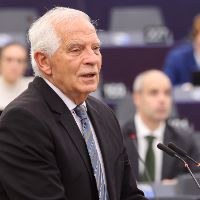(BRUSSELS) – Responding to to Russia’s escalation of its war of aggression against Ukraine and illegal annexation of four of its regions, the EU imposed Thursday a new package of economic and individual sanctions.
The agreed package includes a series of biting measures with which the EU says it intends to reinforce pressure on the Russian government and economy, weaken Russia’s military capabilities, and make the Kremlin pay for the recent escalation.
“This new sanctions package against Russia is proof of our determination to stop Putin’s war machine and respond to his latest escalation with fake ‘referenda’ and illegal annexation of Ukrainian territories,” said the EU’s foreign policy chief Josep Borrell: “We are further hitting Russia’s war economy, limiting Russia’s import/export capacities and are on the fast-track to liberate ourselves from Russian energy dependence. We are also targeting those responsible for the illegal annexation of Ukrainian territories.”
Mr Borrell said the EU’s commitment to stand by Ukraine “for as long as it takes”.
The package agreed today introduces into the EU legislation the basis to put in place a price cap related to the maritime transport of Russian oil for third countries and further restrictions on the maritime transport of crude oil and petroleum products to third countries.
Concretely, the combination of these measures works as follows. It will be prohibited to provide maritime transport and to provide technical assistance, brokering services or financing or financial assistance, related to the maritime transport to third countries of crude oil (as of December 2022) or petroleum products (as of February 2023) which originate in or are exported from Russia.
The price cap derogation would allow the provision of the transport and these services if the oil or petroleum products are purchased at or below a pre-established price cap.
The new prohibition for EU vessels to provide maritime transport for such products to third countries will apply as of the date in which the Council will unanimously decide to introduce the price cap.
The price cap will drastically reduce the revenues Russia earns from oil after its illegal war on Ukraine has inflated global energy prices. The oil price cap can also serve to stabilise global energy prices.
As concerns trade, the EU is extending the import ban on steel products that either originate in Russia or are exported from Russia.
Further import restrictions are also imposed on wood pulp and paper, cigarettes, plastics and cosmetics as well as elements used in the jewellery industry such as stones and precious metals, that altogether generate significant revenues for Russia.
The sale, supply transfer or export of additional goods used in the aviation sector will also be restricted.
EU restrictive measures in response to the crisis in Ukraine (background information)



